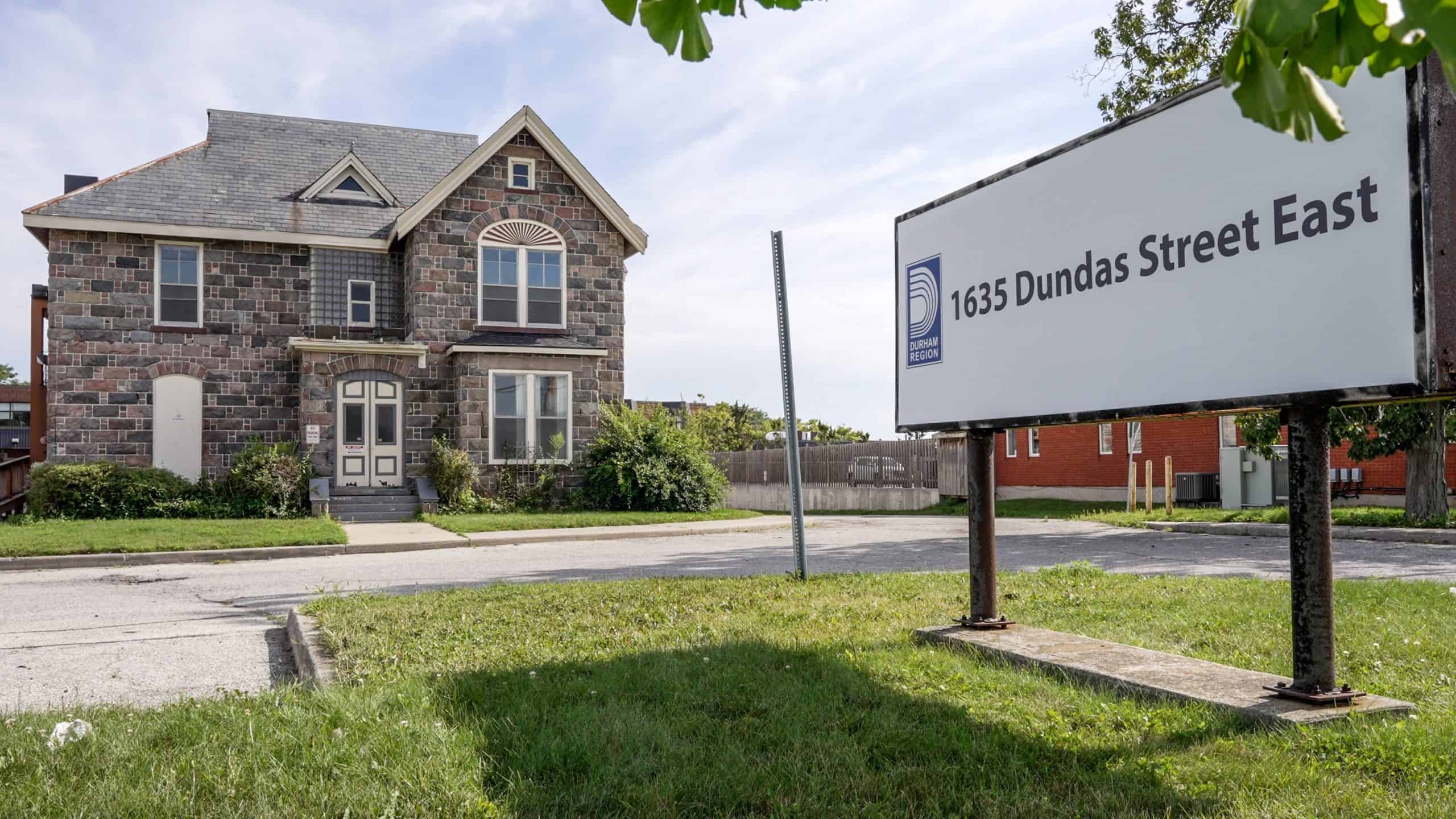Homeless shelter in Whitby moves to Phase 2 with 70 more housing units in project’s future
Published July 15, 2024 at 4:09 pm

A 45-bed low barrier shelter that opened in Whitby in March after an eight-month battle with a vocal segment of the community is moving to Phase 2, with feedback from the public wanted to guide the next step in the shelter’s development.
Lisa McIntosh, Durham’ Region’s Director of Income, Employment and Homelessness Supports, told INdurham the site is currently capped at 45 beds but concept site plans allow for an additional 70 supportive housing units.
“Phase 2 of the 1635 Dundas Street East project focuses on implementing what we heard from community engagement during Phase 1 and creating housing units with health and social supports and services,” she said, adding that the conceptual design for the second phase was presented at a Regional Council meeting June 26. “Feedback received during Phase 2 will help to inform the planning and program development processes.”
The shelter with wraparound supports opened in the building at the end of March and has provided a “safe and supportive environment” to more than 100 people since then, with an occupancy rate has been “at or near capacity” since opening.
The shelter is in a building which was initially built as a farmhouse in the 1880s and was converted into the Sunnycrest Nursing Home in the 1950s. The nursing home was forced to shut down in 2020 after a scathing report declaring it had caused “actual harm” to residents during the pandemic, with 34 residents dead following the early months of the COVID-19 pandemic thanks to inconsistent infection prevention and control practices and other transgressions.
The property sat vacant until 2023 when the property was bought by the Region, with an announcement that fall that it would be turned into a homeless shelter.
That set off a firestorm of anti-homeless rhetoric from some residents, with public engagement sessions quickly turning violent with one man physically threatening Whitby Mayor Elizabeth Roy and Councillor Maleeha Shaheed.
With Durham’s unsheltered population nearly tripling during the pandemic and resources for homelessness “exhausted,” the Region continued to push for support for the shelter, though the pushback prompted several concessions on the project such as tighter security and a lower resident cap.
“A new facility like this can be scary and difficult to understand for the community,” said Regional Chair John Henry in a statement last year, while promising to keep the community informed about the shelter during the process. “This facility will support the people who are currently having to live outdoors in Whitby — in ravines and in the area surrounding 1635 Dundas.”
The 1635 Dundas Street East project is a multi-phase initiative aimed at providing safe and inclusive housing support solutions to help individuals and families who need it most, noted McIntosh, who said the survey “is an opportunity for community members to view the concept plans and provide input on additional programming supports.”
The survey is available on Your Durham until September 27. Feedback, McIntosh said, will be shared in the fall.
During Phase 1 engagement, areas of need cited by respondents included:
- Individual housing options
- Programming supports to ensure physical, mental and addiction health needs are met
- Partnerships with service providers to support growth opportunities for people including life skills and employment options
Phase 2 now focuses on implementing what was heard. “By building a continuum of housing on site, 1635 Dundas Street East will provide transitional housing for those experiencing homelessness, supportive housing for those requiring specialized services, and accommodations for independent living,” McIntosh explained.
Christian Faith Outreach Centre is the service provider for the shelter and provides a wide range of supports and services to help residents get back on their feet, including:
- On-site mental health and addictions support provided by Lakeridge Health/Pinewood
- On-site harm reduction support services, housing, and employment assistance provided by John Howard Society
- Medical support provided by Durham Community Health Centre (DCHC).
- Arts Programming
- We Grow Food Gardening project
The shelter spaces, both current and future, will provide indoor space as the urgent need to provide shelter for Durham’s vulnerable population continues to grow, Henry added. “The site will allow people to stay inside during the day and work toward their goals.”
“The ultimate goal here is to end chronic homelessness.”
With files from Liam McConnell






